Architectural Engineering
 Caroline Mumm, an architectural engineering major, represented the department during a summer abroad program at Freie Universität Berlin International Summer University (FUBis). Mumm returned with a deeper understanding of the diverse challenges and innovations in sustainable building worldwide.
Caroline Mumm, an architectural engineering major, represented the department during a summer abroad program at Freie Universität Berlin International Summer University (FUBis). Mumm returned with a deeper understanding of the diverse challenges and innovations in sustainable building worldwide.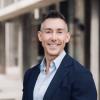 At CU Boulder’s Living Materials Lab, Professor Wil Srubar is developing “bioblocks” made from microalgae that use sunlight, seawater and carbon dioxide to grow carbon-negative limestone—offering a sustainable alternative for use in concrete, cement and other building materials.
At CU Boulder’s Living Materials Lab, Professor Wil Srubar is developing “bioblocks” made from microalgae that use sunlight, seawater and carbon dioxide to grow carbon-negative limestone—offering a sustainable alternative for use in concrete, cement and other building materials.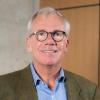 Henze was selected for his groundbreaking work on smart energy control systems, advanced building simulation tools and technologies that connect buildings to the power grid. He is also recognized for his global leadership in research and education.
Henze was selected for his groundbreaking work on smart energy control systems, advanced building simulation tools and technologies that connect buildings to the power grid. He is also recognized for his global leadership in research and education.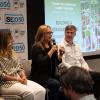 The event, which drew 166 participants to CU Boulder’s campus, marked an industry-wide step toward cutting emissions tied to building materials like steel and concrete.
The event, which drew 166 participants to CU Boulder’s campus, marked an industry-wide step toward cutting emissions tied to building materials like steel and concrete.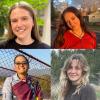 Each of these civil and architectural engineering undergraduates received an award recognizing excellence in one of four areas: community impact, global engagement, academics or research.
Each of these civil and architectural engineering undergraduates received an award recognizing excellence in one of four areas: community impact, global engagement, academics or research.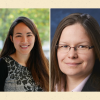 Two department projects funded by the Climate Innovation Collaboratory, an ongoing alliance between Deloitte Consulting LLP and CU Boulder, will develop tools to reduce carbon: one for optimizing data center energy storage, led by Associate Professor Kyri Baker, and one for evaluating local materials in cement, led by Associate Professor Mija Hubler.
Two department projects funded by the Climate Innovation Collaboratory, an ongoing alliance between Deloitte Consulting LLP and CU Boulder, will develop tools to reduce carbon: one for optimizing data center energy storage, led by Associate Professor Kyri Baker, and one for evaluating local materials in cement, led by Associate Professor Mija Hubler.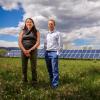 Associate Professor Kyri Baker, of civil, environmental and architectural engineering, and Professor Bri-Mathias Hodge, of electrical, computer & energy engineering, propose that strategically located data centers with energy storage could operate entirely on clean energy.
Associate Professor Kyri Baker, of civil, environmental and architectural engineering, and Professor Bri-Mathias Hodge, of electrical, computer & energy engineering, propose that strategically located data centers with energy storage could operate entirely on clean energy.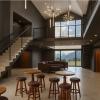 Seven teams from the architectural engineering capstone class presented their 20,000-square-foot student support building designs at the 2025 Engineering Projects Expo.
Seven teams from the architectural engineering capstone class presented their 20,000-square-foot student support building designs at the 2025 Engineering Projects Expo.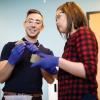 Wil Srubar's aim is to break the reliance on fossil fuels in concrete production by developing a nature-inspired alternative that eliminates the need for fossil fuels and significantly reduces carbon emissions.
Wil Srubar's aim is to break the reliance on fossil fuels in concrete production by developing a nature-inspired alternative that eliminates the need for fossil fuels and significantly reduces carbon emissions.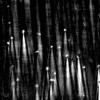 CU Boulder’s Living Materials Laboratory contributed to groundbreaking research showing how engineered microbes can create bioglass microlenses, paving the way for advanced imaging technologies in medicine and materials science.
CU Boulder’s Living Materials Laboratory contributed to groundbreaking research showing how engineered microbes can create bioglass microlenses, paving the way for advanced imaging technologies in medicine and materials science.


